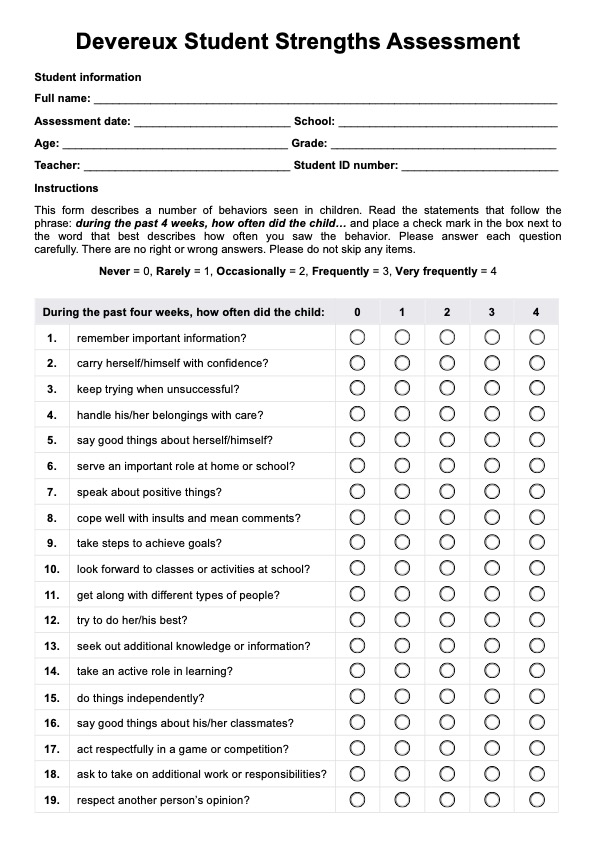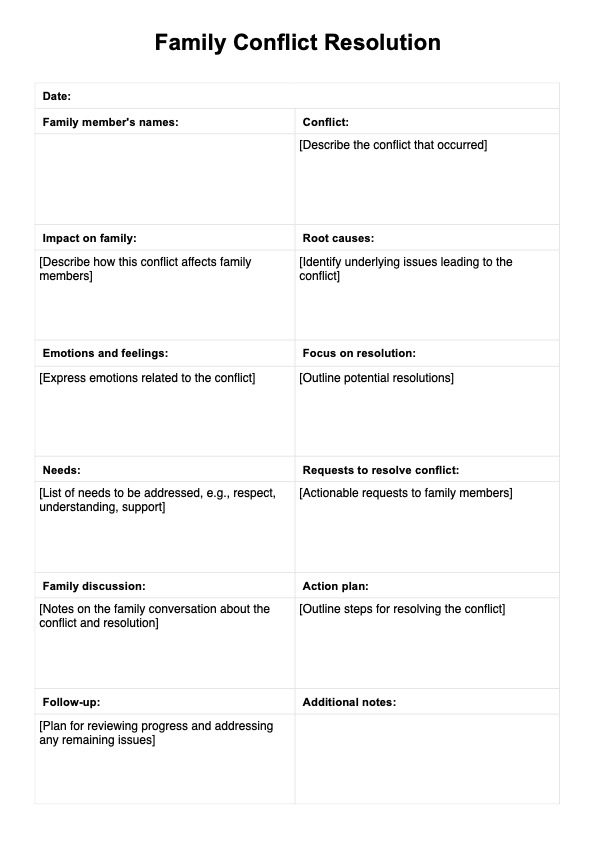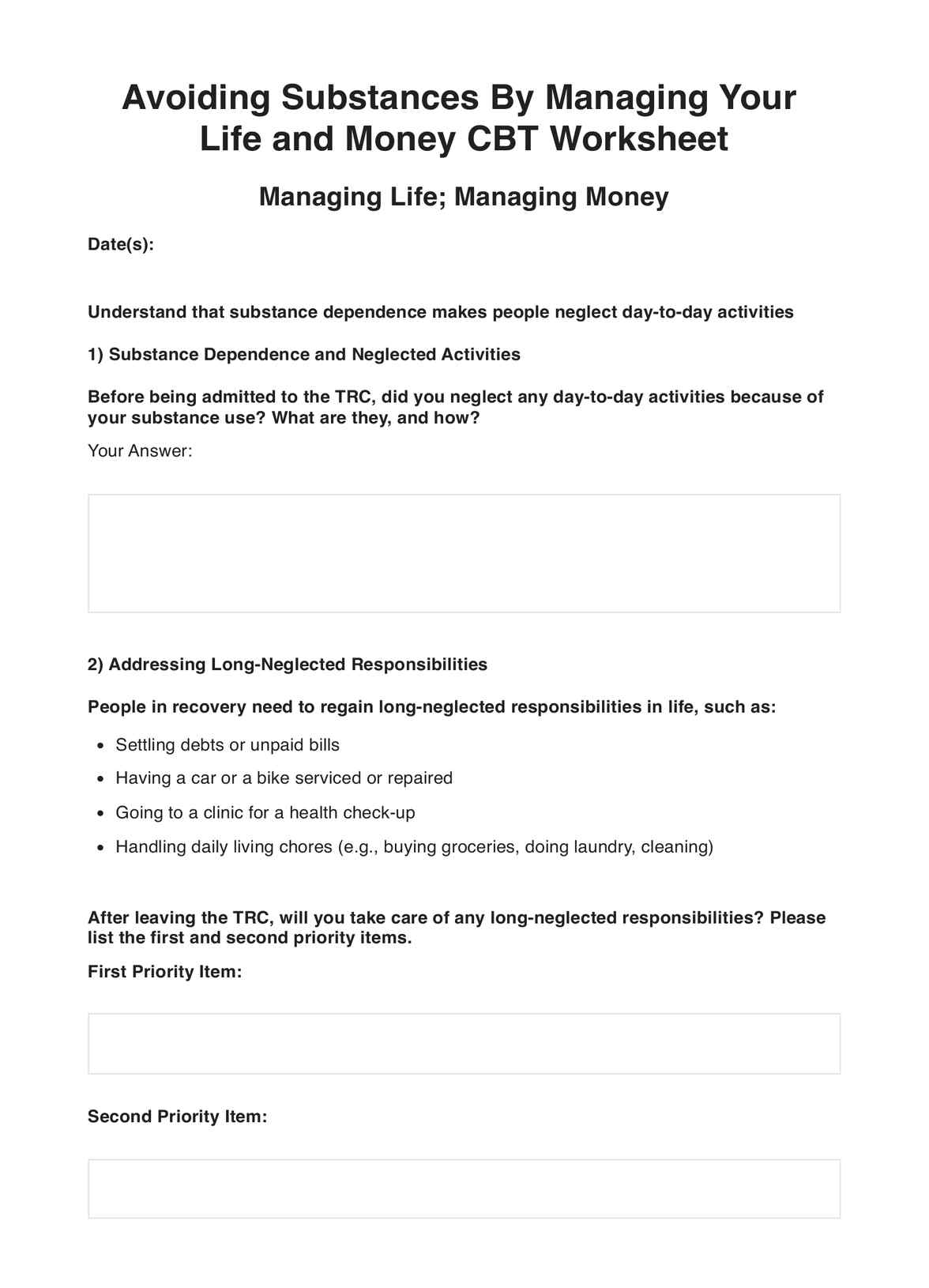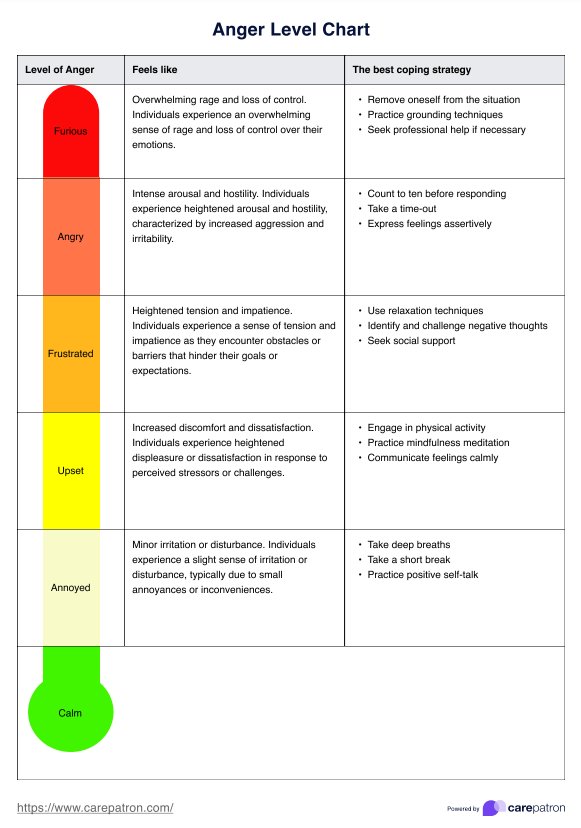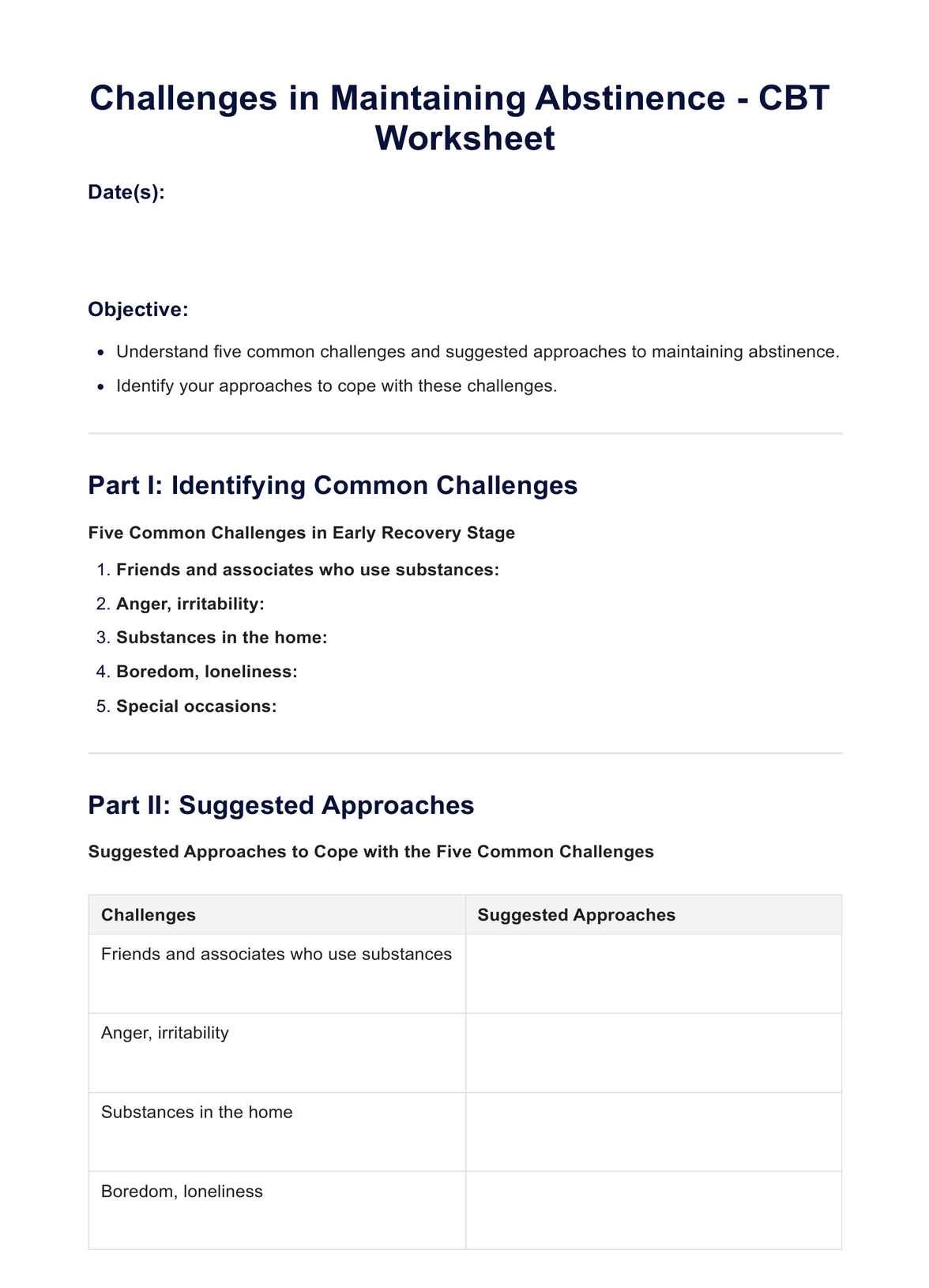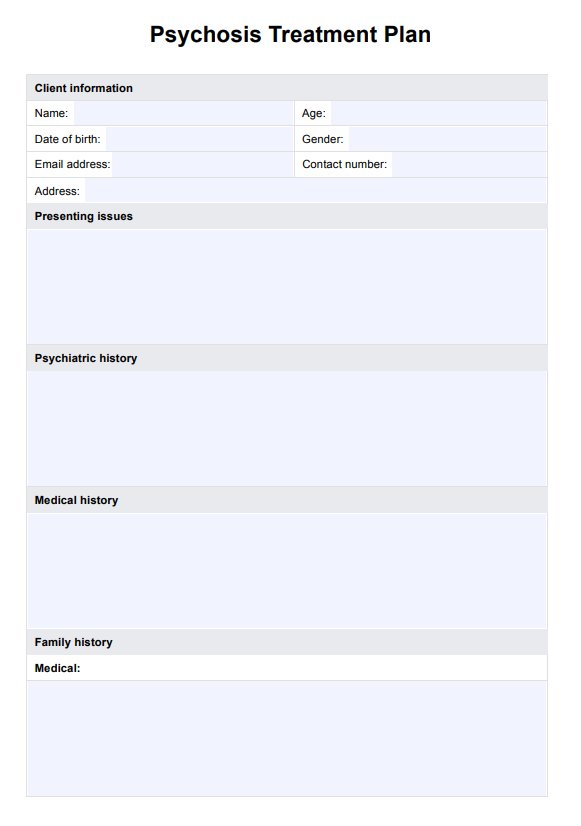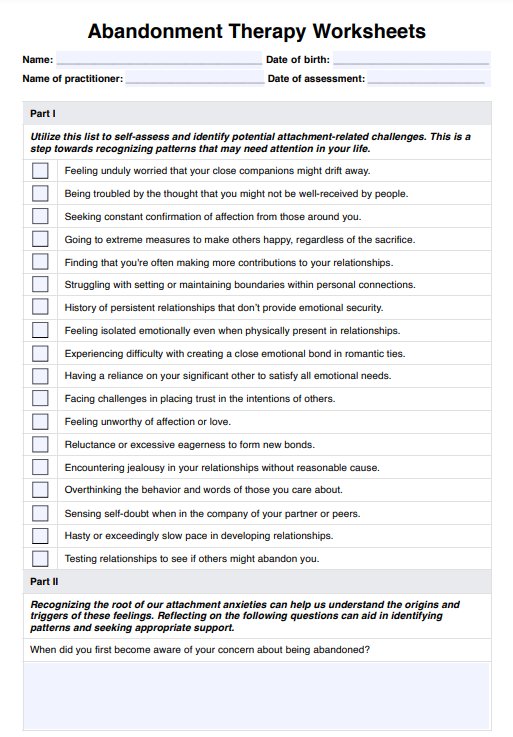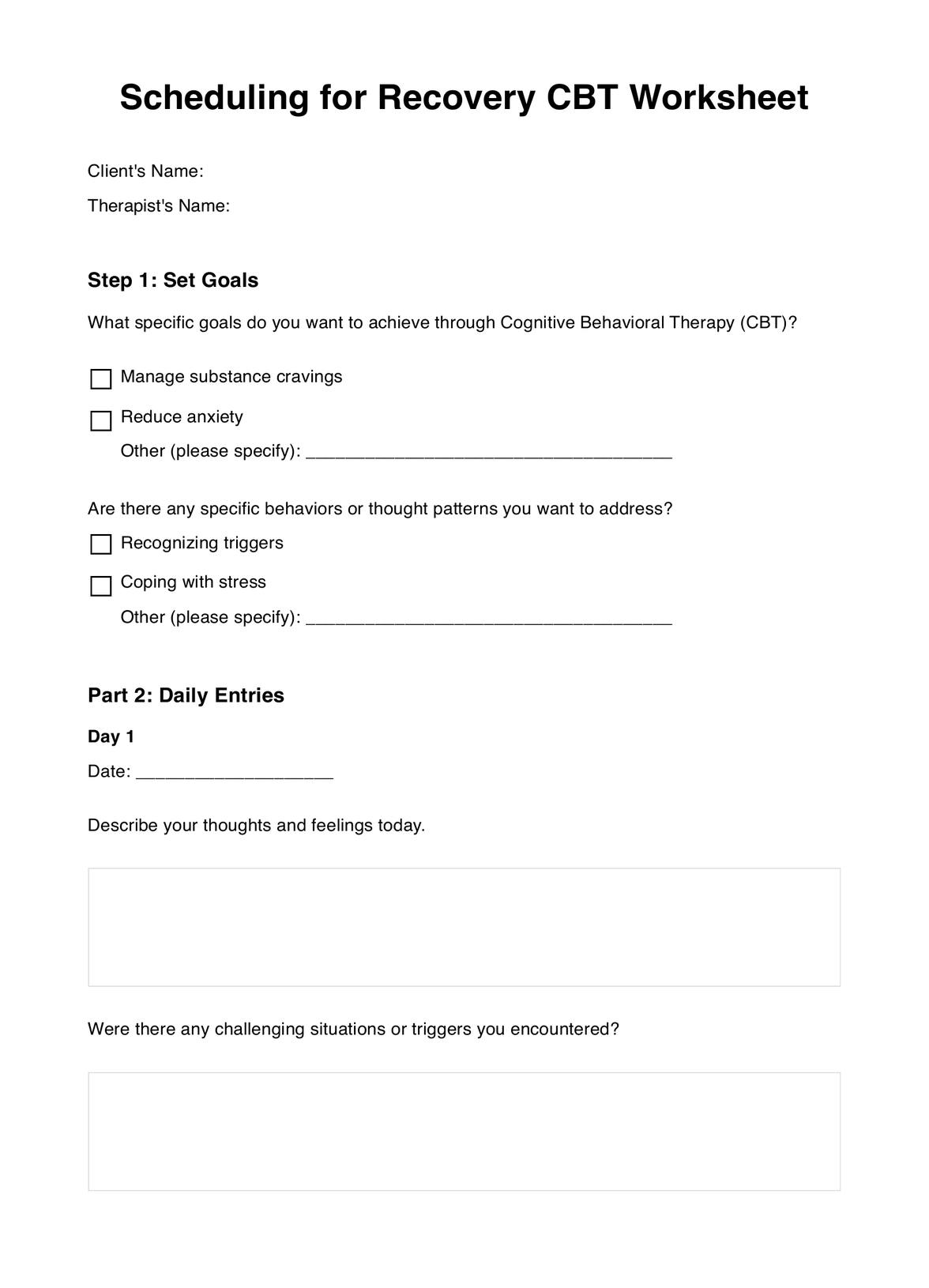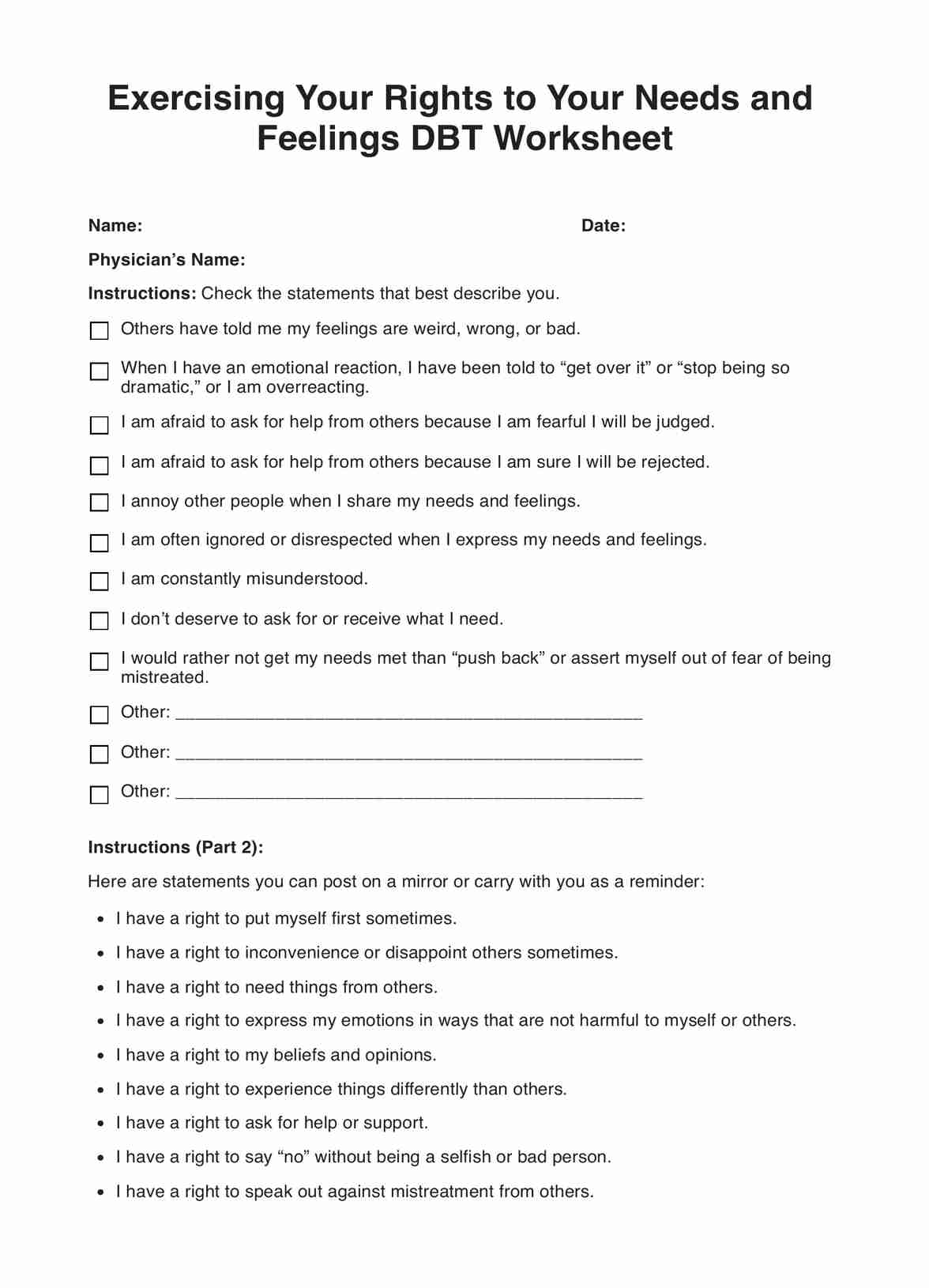Neurodivergent Test
Uncover and identify your neurodivergent traits with our quick and user-friendly Neurodivergent Test for valuable insights and self-awareness.


What is neurodiversity?
Neurodiversity is an umbrella term that recognizes and celebrates the natural variation in neurological and brain functioning, even among individuals. Developed by sociologist Judy Singer in the late 1990s, the term challenges the traditional view of neurological differences as disorders, emphasizing that diverse neurological conditions are natural variations of the human brain. Neurodiversity asserts that neurological differences, common conditions such as autism, ADHD, dyslexia, and others, are not inherently pathological but contribute to and answer many disparities within human cognition.
This paradigm shift advocates for acceptance and inclusion, promoting the idea that neurodivergent individuals bring unique strengths, perspectives, and talents to society. Rather than focusing solely on treating or normalizing differences, the neurodiversity movement calls for creating environments that accommodate and appreciate diverse cognitive styles. It encourages a shift from a deficit-based model to one that recognizes the value of cognitive diversity and fosters an inclusive society where everyone can thrive.
By embracing the concept of neurodiversity, society moves towards a more equitable and understanding approach to neurological differences, challenging stigmas and fostering environments that celebrate the strengths inherent in diverse ways of thinking and processing information. Neurodiversity is about acknowledging differences and advocating for the rights, dignity, and equal opportunities for all individuals, regardless of their neurocognitive profiles.
Neurodivergent Test Template
Neurodivergent Test Example
What are some symptoms of neurodivergence?
The umbrella term of neurodivergence encompasses a wide range of conditions and disorders that affect the brain's functioning and processing of information. One common set of symptoms involves challenges in academic and motor skills, such as struggling with reading and writing or exhibiting clumsiness. These difficulties may manifest early in life and persist throughout development, often requiring targeted support and interventions to help individuals successfully navigate their academic and daily tasks.
Another hallmark of neurodivergence is heightened sensitivity to sensory stimuli. Individuals may find it challenging to cope with crowded environments, bright lights, loud noises, or sudden changes in their surroundings. Such sensitivities can lead to discomfort and anxiety, impacting a neurodivergent person's ability to engage in social situations or navigate public spaces. Understanding and managing these sensitivities are crucial for creating supportive and accommodating environments for neurodivergent individuals.
Additionally, difficulties with attention and self-regulation are common symptoms. Neurodivergent individuals may struggle with focusing on multiple tasks or have trouble staying still, affecting their performance in various settings. These challenges can be particularly evident in academic and work settings, where sustained attention is often required.
Social communication differences are another key aspect of neurodivergence. Some individuals may exhibit limited or atypical social responsiveness, such as a lack of smiling or difficulty understanding social cues. These differences can impact interpersonal relationships and social interactions, making it important for society to foster inclusivity and understanding.
It's essential to note that neurodivergent individuals may not exhibit all of these symptoms, and the manifestation and severity of symptoms can vary widely among different conditions. Recognizing and understanding these diverse symptoms is crucial for promoting acceptance, providing appropriate support, and fostering a more inclusive society for neurodivergent individuals.
Neurodivergent vs. neurotypical
The terms neurodivergent and neurotypical describe variations in neurological development and functioning. These concepts are often applied within the context of conditions such as autism, ADHD, dyslexia, and other neurodevelopmental differences. Understanding the distinctions between neurodivergent and neurotypical brain function can contribute to building a more inclusive and supportive environment for individuals with diverse neurological profiles.
Neurodivergent
- Definition: Neurodivergent refers to individuals whose neurological development and functioning differ from typical or "neurotypical."
- Examples: People with autism, ADHD, dyslexia, Tourette syndrome, and other neurodevelopmental conditions are often considered neurodivergent.
- Characteristics: Neurodivergent individuals may exhibit a range of cognitive, sensory, social, and behavioral differences. These variations are not necessarily deficits but reflect diverse ways of processing information and experiencing the world.
Neurotypical
- Definition: Neurotypical describes individuals whose neurological development and functioning align with what is considered typical or within the expected range.
- Examples: Most people without neurodevelopmental conditions are considered neurotypical. However, it's important to note that neurotypicality exists on a spectrum, and individuals may still have unique cognitive and behavioral differences.
- Characteristics: Neurotypical individuals typically exhibit cognitive and social behaviors that align with societal norms. They may find it easier to navigate conventional social expectations and educational structures.
Understanding and embracing neurodiversity involves recognizing that neurological differences are a natural and valuable part of human diversity. Rather than framing neurodivergence solely as a deviation from a norm, the concept of neurodiversity promotes the idea that diverse neurological characteristics contribute to the richness of human experience. Creating inclusive environments that accommodate and celebrate neurodiversity fosters a more compassionate and understanding society where individuals of all neurological profiles can thrive.
Neurodivergent examples and traits
Neurodiversity encompasses a broad spectrum of conditions, including learning disabilities like dyslexia, dyscalculia, dyspraxia, and ADHD; developmental disorders such as autism spectrum disorder and Down syndrome; mental health conditions like anxiety, depression, and bipolar disorder; and sensory processing disorders like auditory and visual processing disorders.
Individuals with neurodivergent conditions may process information, think, and learn differently from those with neurotypical brains. This diversity in cognitive functioning also comes with unique strengths and weaknesses. For instance, individuals with autism may face challenges in social interaction and communication, alongside displaying repetitive behaviors and intense interests. Those with dyslexia may struggle with reading and writing, including spelling and pronunciation difficulties. ADHD may manifest as difficulty in paying attention, hyperactivity, or impulsivity.
Similarly, mental health conditions like anxiety and depression can bring about excessive worry, overthinking, fear, sadness, and changes in physical symptoms. Despite these differences, it's crucial to emphasize that neurodiversity in mental illnesses is not inherently negative. Many individuals with neurodivergent conditions possess unique talents and abilities that contribute positively to the world. Recognizing and appreciating this diversity is essential for fostering understanding and acceptance and creating inclusive environments that allow everyone to thrive.
Conditions that fall under the “neurodivergent” umbrella
The neurodivergent umbrella encompasses a wide array of possible results of conditions, but here are some of the most prominent ones:
Learning disabilities
- Dyslexia: Difficulty with reading fluency, decoding, and spelling.
- Dyscalculia: Difficulty with math concepts and calculations.
- Dysgraphia: Difficulty with handwriting and fine motor skills.
- Dyspraxia: Difficulty with motor planning and coordination.
- Attention Deficit Hyperactivity Disorder (ADHD): Difficulty with attention, focus, and impulse control.
Developmental disorders
- Autism Spectrum Disorder (ASD): Diverse range of challenges in social communication, repetitive behaviors, and sensory processing.
- Down syndrome: Chromosomal condition affecting cognitive and physical development.
Mental health conditions
- Anxiety disorders: Excessive worry, fear, and physical symptoms like rapid heart rate.
- Depression: Persistent feeling of sadness, hopelessness, and loss of interest.
- Bipolar disorder: Mood swings between mania and depression.
- Schizophrenia: Distorted perception of reality and hallucinations.
Sensory processing disorders
- Auditory processing disorder: Difficulty processing and interpreting auditory information.
- Visual processing disorder: Difficulty processing and interpreting visual information.
Other conditions
- Tourette syndrome: Involuntary tics and vocalizations.
- Chronic fatigue syndrome: Persistent fatigue with no clear cause.
How the Neurotypical Test works
A Neurotypical Test is a quiz designed to explore cognitive, social, and sensory experiences that might work by presenting individuals with a series of yes/no questions. The aim is to prompt self-reflection on various aspects related to neurotypical traits. The questions cover a range of topics, such as social interactions, communication skills, sensory experiences, learning patterns, attention, and personal interests.
The purpose of these tests is to encourage individuals to consider how they navigate and experience the world in comparison to generalized neurotypical characteristics.
Additionally, any form of self-assessment has limitations. The nuances and complexities of neurodiversity, encompassing a broad spectrum of conditions, cannot be fully captured through simple questions. Factors such as individual differences, context of diagnosis, and the evolving understanding of neurodivergent traits contribute to the challenge of creating a one-size-fits-all assessment.
Neurodiversity is better understood through comprehensive and disorder-specific evaluations by qualified healthcare professionals, psychologists, or specialists. These assessments use standardized tools, clinical interviews, and observations to understand an individual's cognitive profile better, considering the rich variability within the neurodivergent and neurotypical spectrums.
Interpreting the test results
Communication and social interaction
Positive responses may indicate challenges in social communication, preference for specific routines, or discomfort in large social gatherings. These can be common traits associated with conditions such as autism or social anxiety.
Sensory sensitivities
Affirmative answers could suggest heightened sensory sensitivities, a characteristic often found in conditions like sensory processing disorder or ADHD.
Attention and focus
Yes, responses may suggest difficulties with attention and focus, which could be associated with conditions such as ADHD.
Learning and work patterns
Positive responses may indicate unique learning styles or challenges in academic or work-related tasks, which could be associated with various neurodivergent conditions.
Repetitive behaviors and interests
Affirmative responses may suggest engaging in repetitive behaviors or having intense interests, common traits in conditions like autism.
Emotional well-being
Positive answers may indicate challenges in emotional regulation or heightened emotional experiences, which can be associated with various neurodivergent conditions.
Managing neurodivergence
Managing neurodivergence involves recognizing and respecting the diverse ways individuals experience the world, particularly those with conditions such as autism spectrum disorder (ASD), ADHD, dyslexia, and others. Tailored approaches are essential, as neurodivergent individuals may have unique strengths and challenges. Creating an inclusive environment that accommodates various communication styles, sensory preferences, and learning methods is crucial.
Supportive workplace and educational practices, such as providing clear instructions, minimizing sensory distractions, and offering flexibility, can enhance the well-being and productivity of neurodivergent individuals. Moreover, fostering understanding and empathy within communities helps break down stigmas associated with neurodivergence. Offering access to resources, such as counseling or therapy, can benefit emotional well-being.
Ultimately, embracing neurodiversity involves promoting acceptance, adapting environments to diverse needs, and celebrating the valuable contributions of neurodivergent individuals to society.
Using Carepatron as your psychology software
In utilizing Carepatron as your psychology software, the platform provides a comprehensive solution for effective practice management and clinical tools, streamlining various aspects of mental health care.
Appointment scheduling is made efficient through features like online booking and reminders, ensuring a hassle-free process for both practitioners and clients. The secure storage and management of client records, including notes, progress reports, and treatment plans, contribute to an organized and centralized system, enhancing the overall quality of care.
The platform's billing and invoicing tools simplify financial processes, allowing for the seamless generation of invoices, online payment acceptance, and efficient management of insurance claims. Carepatron also facilitates telehealth, enabling secure video consultations to connect with clients remotely, thereby increasing accessibility and flexibility in mental health care delivery.
Clinically, the software supports practitioners with psychological assessments, progress notes, and treatment plans. The client portal empowers individuals to actively engage in their care by managing appointments, accessing records, and securely communicating with practitioners.

Commonly asked questions
Neurodivergence encompasses a wide range of conditions requiring specific assessments by qualified professionals. However, you can do general screening to gauge if you may have neurodivergent qualities.
No, self-tests, a self-screening tool, or a neurodivergent quiz all lack validity and can lead to misdiagnoses, which can be harmful.
Self-diagnosis for a neurodivergent person is not recommended. Seeking professional evaluation ensures an accurate, formal diagnosis and appropriate support.


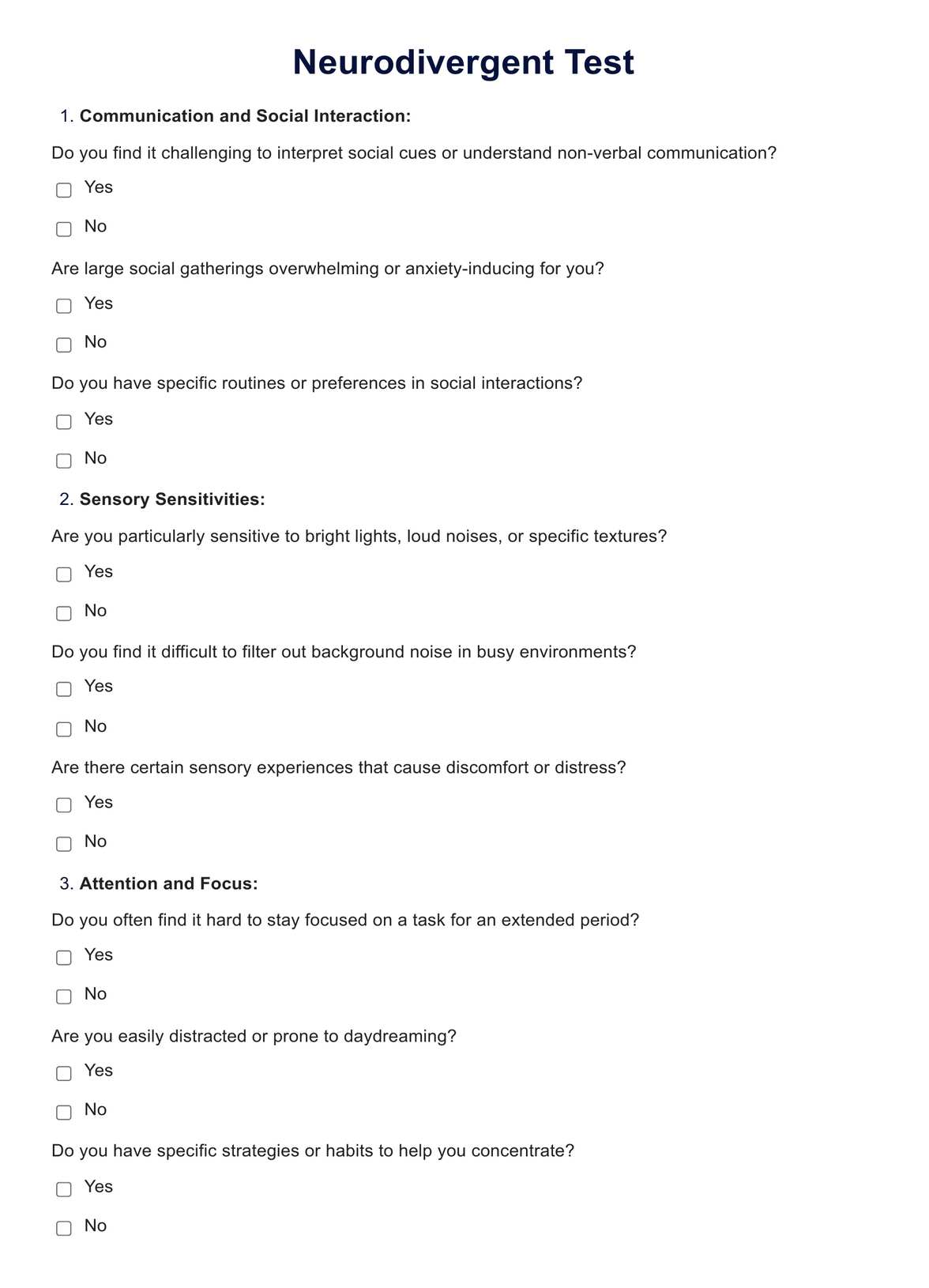
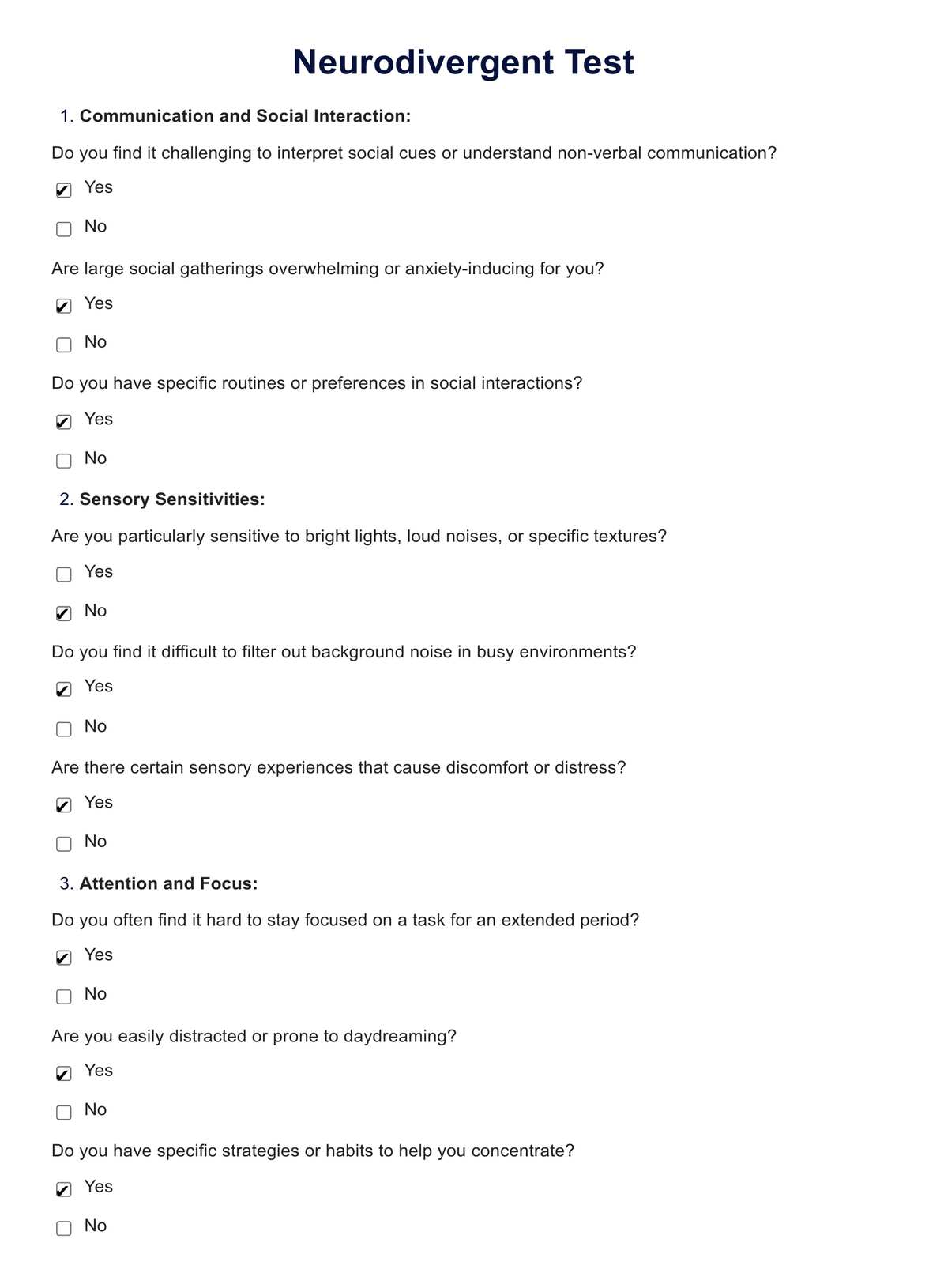

















-template.jpg)

























